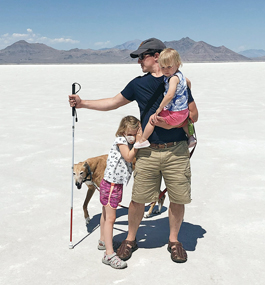Turning Points
Perception Is Reality

Courtesy Eric J. Harvey
Eric Harvey at Utah’s Bonneville Salt Flats with his daughters
by Eric J. Harvey, MA’11, PhD’20
“You know,” said the doctor, “you could go blind from something else long before you go blind from this.”
My journey to this dubious reassurance began several months earlier, during the summer after my first year of PhD research. I was working at an archaeological excavation in Ashkelon, Israel, on the southern Mediterranean coast. After long days of digging in the blazing sun, I would return to the cool dimness of my hotel room. As I washed off the dust and grime, my visual field would fill with tightly tessellating patterns of moving and flashing lights, resembling something like honeycomb or the bumpy surface of a basketball.
Back in Waltham, my search for answers led me from my optometrist to an ophthalmologist, and then to a retina specialist. Sitting there, in front of this doctor with his white coat and bow tie, I received my diagnosis: retinitis pigmentosa.
The disease, he said, involved the gradual deterioration of the retina, the thin sheet of photoreceptor cells at the back of the eye that turn light into electrical brain signals. As these cells sicken, they flail and fire erratically, and the brain creates flashing lights to make sense of the chaos. Eventually, the cells die, taking all vision and light perception with them. How long would that process take? Impossible to say — everyone’s pace and pattern of progression is different. In all likelihood, though, it would take decades.
Perhaps the retina specialist meant to reassure me that blindness was still far off, that I didn’t need to worry about it just yet. Or maybe he was hinting at a deeper, harder truth: the twin constants of inevitability and unpredictability, which have defined my life from that day on.
Blindness was inevitable. Whether from retinitis pigmentosa or something else, I now faced it as an inescapable fact.
But blindness was also unpredictable. Retinitis pigmentosa, it turns out, is not one disease but many — it’s an antiquated categorization that includes more than 250 unique variations on the theme of retinal degeneration. The pace and pattern of progression varies wildly, depending on the underlying genetic cause. In reality, it hardly matters when the last photoreceptor blinks out, because blindness comes long before that, either in a steady progression or in waves.
Blindness isn’t simply the absence of eyesight. Blindness is the need to reconfigure every aspect of life to accommodate a different set of senses. It’s adopting nonvisual techniques to accomplish every task, from the mundane and rudimentary to the sophisticated and arcane. These techniques must be learned, practiced and perfected.
This was the blindness I had to accept and anticipate. I didn’t know when I would lose the ability to perform a certain task visually, and waiting to find out would have been the wrong approach. I couldn’t afford to start learning new skills only when I needed them. Instead of asking what skills I needed now, I had to start asking what skills I would need in two years, five years and 10 years.
The progression of my vision loss happened faster than anyone had predicted. Even though I still have plenty of working photoreceptors, by mid-2014 I had crossed the threshold into legal blindness. By 2015, I could no longer read print or write with a regular word processor. By 2017, I was walking with a white cane.
Luckily, Brandeis, state government agencies and the blind community offered me the time and the resources I needed to learn nonvisual techniques as I completed my PhD. Although getting my doctorate took me nine years instead of six, I am just as well-prepared for teaching and research as I would have been with retinas intact.
Disability is not itself a tragedy. It can be made one, however, by denial or deprivation. If I had not acknowledged the reality of my situation, I would not have been able to respond, adapt and grow. The same would be true if I had not had access to the necessary training, resources or time.
As my vision ebbed, I knew I couldn’t stop this loss from coming, or predict its timing or the form it would take. But with forethought and support, I have been able to imagine entirely new ways of living, learning and moving through the world. And I always will.
Eric J. Harvey is a visiting research scholar in the Department of Near Eastern and Judaic Studies. Read more of his writing at www.blindscholar.com.
